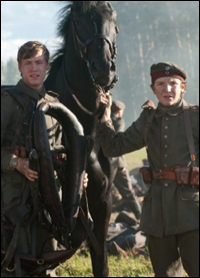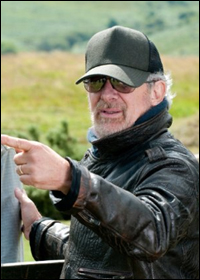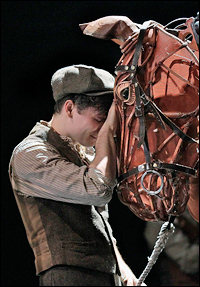
*
It took him 30 years to do it, but Michael Morpurgo finally got his bid in for Joey, the World War I workhorse with the thoroughbred heart that he created.
At a recent Wednesday matinee of War Horse, the author of the original 1982 story popped up on the stage of the Vivian Beaumont Theater amid the actors playing English rustics at a horse auction and lobbed off a couple of unsuccessful early bids before the horse was snapped up by a drunken Devon farmer and led off to the nearby plow fields and, eventually, to the battlefields of the First World War.
CBS cameras were there to catch this fleeting cameo, and the resulting piece and interview aired Jan. 15 on "CBS Sunday Morning." Morpurgo did a similar one-time-only cameo in the London production and landed a bit part in the movie version.
The Lincoln Center Theater walk-on would have gone completely unnoticed by the theatregoers in attendance, had a special flyer not been inserted in the Playbill announcing that Michael Morpurgo, at this performance, was being played by himself. Padding the part a bit, the auctioneer in charge addressed him by name. Morpurgo materialized for the curtain call as well, dead-center in a vast cluster of Devon denizens taking a bow. "It was lovely to be a part of that, y'know," he said afterward. "I live in a tiny place in the middle of Devon where it all started, and now it's in a theatre like this being acted out, and Spielberg's done the movie."
If he took to the stage with a certain in-born panache, that's because his birth father was Tony Van Bridge, a British-born Canadian actor — although Morpurgo never knew that until he was 19. He and his family were watching a CBC adaptation of Charles Dickens' "Great Expectations" — the early scene in the graveyard with Young Pip when a grizzled escaped-convict jumps out at him from a gravestone — and his mother suddenly shrieked at him, "My God, Michael! That's your father!"
Morpurgo followed up on this late-arriving bit of news and became friends with Van Bridge, who twice trod the boards of the Beaumont (as Ulysses in 1968's Tiger at the Gates and as Jacob Lehmann in 1969's In the Matter of J. Robert Oppenheimer). "I love full circles," he said, after trotting the same boards.
 |
||
| David Kross and Leonhard Carow in "War Horse." |
||
| photo by David Appleby – © DreamWorks II Distribution Co., LLC. All Rights Reserved |
He also got in some script licks himself with Lee Hall for producer Revel Guest. They worked on the script for three years without pay, crafting it the way they thought it should be — "then, out of the blue, Kathleen Kennedy walks into the show in London, fell in love with it, rang up Spielberg. He read the book, came over a week later, saw it, raved about it, saw it two more times — came to Revel, Lee and me and said, 'What do you think? Can we do this together?' And that's just what we did. It has been a wonderful collaboration with DreamWorks."
Morpurgo would be ungrateful, or insane, to admit to a marked preference for the play or the film. "Obviously, they have very, very different takes on the story, but I come away from both feeling that I've had an extraordinary experience. They took the best of my book and turned it into whichever medium they were working in.
"The play is not my book. This is Tom Morris' take on my book, but he has kept its spirit and its integrity and made this iconic play, bringing to it all of these huge talents and the music and the lighting and the designs — just phenomenal stuff.
 |
||
| Steven Spielberg on set |
||
| © 2011 - DreamWorks II Distribution Co., LLC. |
 |
||
| Seth Numrich in the Broadway production |
||
| photo by Paul Kolnik |
"I suppose at the end of it, I rejoice in it — and that's why I'm here. It's a wonderful thing to be working, in a little way, with what these people are putting together every night. I'm conscious they're working their socks off — and I'm sitting there in England, and someone sends me a check every month, but these guys do the work."
With claps of thunder from both mediums, Morpurgo made a point while he was in town to seek out his quiet little postscript to War Horse that was playing at 59E59 Theatre through Jan. 1, Farm Boy, a two-hander adapted and directed by Daniel Buckroyd for Richard Pryal and John Walters.
"It did well in England, and it's interesting to go see something after these huge spectacles," Morpurgo noted. "It's small, contained, much more like ordinary theatre — a sequel about what happens to Joey and Albert back on the family farm."
It's another of those moments of great and lasting change. Having been rendered lethally obsolete on the battlefield by the tank and the other munitions of war, Joey is now displaced on the farm by the tractor. Ain't that a kick in the head?
View highlights from the show:










